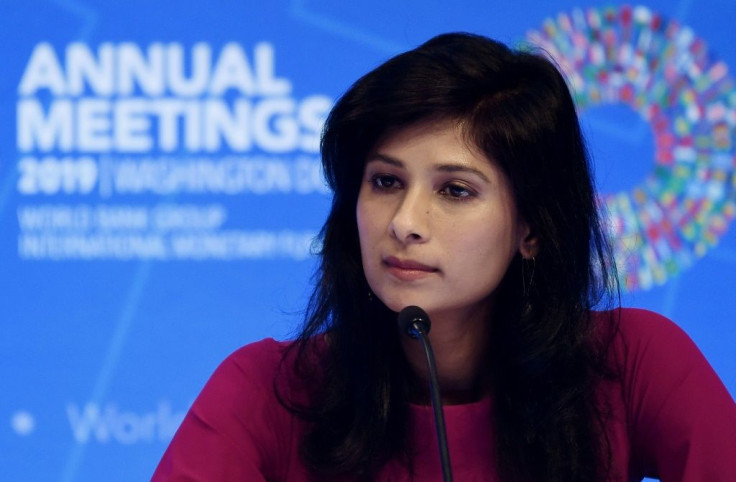Weakness In India Accounted For Vast Majority Of IMF’s Cut Of Global Growth Estimate

KEY POINTS
- IMF projected global growth at 2.9% for 2019 and 3.3% for 2020
- IMF cut India’s GDP forecast for fiscal 2020 to 4.8%
- IMF expects India's growth rate to improve to 5.8% in fiscal 2021
India’s weakening economic growth was responsible for 80% of the reduced global economic growth estimate by International Monetary Fund, or IMF.
So claimed IMF chief economist Gita Gopinath who is attending the World Economic Forum in Davos, Switzerland.
"We [IMF] have projected global growth at 2.9% for 2019 and 3.3% for 2020 which is [0.1%] lower than the October estimates,” Gopinath said on Tuesday. “The vast majority of it comes from our downgrade for India which was quite significant for both years. Simple calculation says [India’s contribution to the lowered estimate] would be over 80%."
On Monday, IMF also cut its economic growth estimate for India for fiscal 2020 to 4.8%.
"The first two quarters of [India’s economic performance in fiscal 2020] came in weaker than we projected,” she added. “One sector where we are seeing the most stress is the financial sector -- the non-bank financial corporations. We have seen a sharp decline in credit growth and a weakened business sentiment. All this led to the revised numbers."
However, IMF projected India's growth rate to improve to 5.8% in fiscal 2021 and 6.5% in fiscal 2022.
"We see India recovering,” Gopinath added. “There is a significant recovery coming in the next fiscal year. There is a fair amount of monetary stimulus in the system, corporate tax cuts are also there -- these should help with recovery in growth."
Gopinath said the Indian government needs to stimulate growth without exacerbating the problem of non-performing assets, or NPAs.
"The most major issue to address is the weakness in credit growth,” she said. “There need to be policies that can resuscitate credit growth but at the same time don't create further NPA problems, that is the first step. There needs to be a quicker recapitalization of banks.”
In response to Gopinath’s comments and the IMF cutting growth rates, P. Chidambaram, former finance minister and now a leader of the opposition Congress party, said he thinks the government of Prime Minister Narendra Modi will attack Gopinath.
Chidambaram also suspected the actual growth numbers are worse than what IMF has forecast.
"Even the 4.8% [projected growth rate for India] is after some window dressing. I will not be surprised if it goes even lower," he tweeted. "I suppose we must prepare ourselves for an attack by government ministers on the IMF and [Gita Gopinath].”
Chidambaram has often criticized the Modi government's fiscal policies and recently chided commerce minister Piyush Goyal for downplaying a pledge by Amazon CEO Jeff Bezos to invest $1 billion in India’s retail sector.
Goyal, who leads the Indian delegation at Davos, said that India is burdened by a massive trade deficit, particularly with China.
Indeed, bilateral trade between India and China dropped by about $3 billion last year while India’s trade deficit reached $56.77 billion, although that was a decline from $58.04 billion in 2018.
"Any [trade] pact needs to take into account several factors,” he said. “India is grappling with a huge trade deficit, particularly with China and many other nations in the region."
Goyal added that the Indian government is seeking ways to make trade relations more equitable.
"[India is] like a pivot for the Indian Ocean and we believe this region has huge potential. At the same time, India is very much concerned about the issue of climate change," he said. "Going forward, the entire [group of nations] around the Indian Ocean will play a very important role, while keeping in mind fair and equitable distribution. India also expects greater cooperation among various nations on climate change. We in India are also working on how to put in place more equitable terms in our trade relations with various countries."
© Copyright IBTimes 2024. All rights reserved.



















